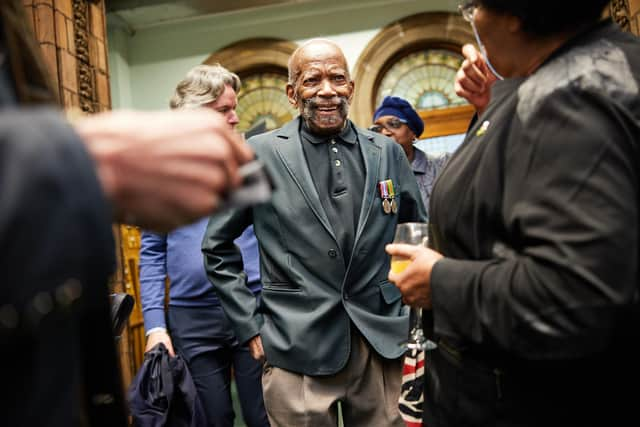Why the stories of Caribbean communities in places like Leeds need to be shared - Susan Pitter
It started in 2019 with Eulogy, which told the story of first-generation Jamaicans who came here during the 1940s. They include my parents who came in the early 60s, so for me this is a personal story as well as one that reflects the community in which I grew up.
Eulogy lifted the lid on so many remarkable and inspiring stories and we followed it with Out of Many, a yearlong festival celebrating Jamaican heritage and its cultural impact. The latest exhibition, For King, Country & Home, which runs at Leeds Central Library until June 24 and brings our festival to a close, tells the poignant story of Jamaican Second World War RAF veterans who volunteered as teenagers and young men to answer Britain’s call to defend ‘the Mother Country’.
Advertisement
Hide AdAdvertisement
Hide AdAmong them was Alford Gardner. He came here at the age of 18 in 1944, just three days before D-Day. After serving as a mechanic repairing and maintaining vehicles he went back to Jamaica after the war before returning on board HMT Empire Windrush, one of eight West Indian men who headed to Leeds, which became his home. Alford is now 97 and the last of the Jamaican RAF veterans in Leeds, and one of the few people still alive who arrived here on Windrush.


What’s important about these stories is they are about us, told by us. It’s why I worked so closely with families when curating the exhibitions. During the war around 6,000 West Indians, including 80 women who joined the Women’s Auxiliary, responded to RAF recruitment campaigns and signed up. But how many people know that most not only came by invitation, but that they came here as British citizens?
It’s easy to forget, too, that the Caribbean men and women, known as the Windrush generation, who came to this country between 1948 and 1971, did so at our behest. In most cases they, too, travelled here as British citizens, before West Indian countries became independent and Britain changed its immigration laws.
People like my parents took on jobs that couldn’t be filled due to labour shortages, caused partly because there were certain jobs and industries, such as punishing shift work in engineering and the NHS, that some indigenous people didn’t want to take on.
Advertisement
Hide AdAdvertisement
Hide AdIn the 1950s and 60s, thousands of Caribbean and African women answered the call to help grow the health service – women like Nettie White, Betsy Johnson, Liz Powell and Yvonne English, four of the founders of the Jamaica Society, all of whom gave a lifetime of service. They are a generation who spent longer in Britain than they did in their birthplace.
It’s often been said that this country gave them the chance of a fresh start, and that’s true. But they gave back immeasurably more in return, and without them we simply wouldn’t have the Britain we cherish today.
My parents taught me to be proud of where I’m from – of my Jamaican roots, of being born in Britain and a citizen of Leeds. I’m fortunate that I got to meet three of my grandparents. But many second generation West Indians never got to meet any of theirs. My parents’ generation came here as young people who stayed longer than the planned five years and this meant their children missed out on the magical bond between grandparents and grandchildren. This was the price they paid for a better life. I can remember the heartbreak my mum and dad felt being 5,000 miles away when their parents died.
Next month marks the 75th anniversary of the arrival of Windrush at Tilbury docks. We’ve come a long way in the intervening years, but there’s still a long way to go. And this isn’t only a journey for the black community, it’s a journey for all of us.
Advertisement
Hide AdAdvertisement
Hide AdBlack history is British history. It isn’t a chapter, or a page in a book, it’s a thread that runs through it – just look at the profound impact that Caribbean, particularly Jamaican, culture has had and continues to have. Not just on music, food and fashion and not just here in Britain, but worldwide.
Yet it grieves me as a mother and grandmother that there still has to be a struggle to get the kind of stories we’ve been telling through projects like Eulogy and Out of Many taught in schools. And if they aren’t taught in schools my fear is who’s going to tell those stories in the future, when the last of my parent’s generation and my generation have gone?
I believe all these stories deserve to be more widely known because they bring us together – there is joy in these stories. Yes, they tell of people who faced adversity, but they are also a celebration of ordinary people who fell in love, got married, raised families, worked hard and played an active role in their local communities.
Susan Pitter is the director of the Out of Many Festival.